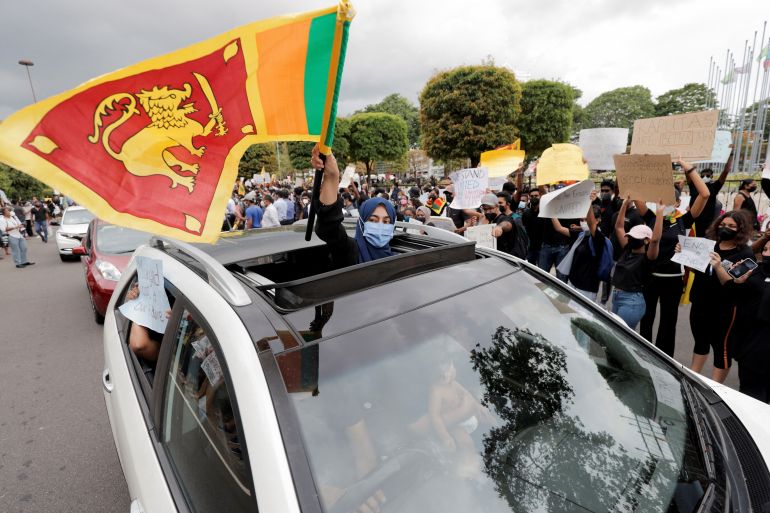Sri Lanka opposition rejects president’s unity government offer
Opposition parties demand the government’s resignation amid protests over worsening shortages of food, fuel and medicines.

Sri Lanka’s opposition has rejected an invitation from the president to form a unity government, urging his resignation over the country’s worsening shortages of food, fuel and medicines.
The opposition’s demand on Monday came as anti-government protests continued throughout the country over its worst economic crisis in memory and deepening mistrust in President Gotabaya Rajapaksa’s leadership.
Keep reading
list of 4 itemsCan the dire economic crisis in Sri Lanka be solved?
Sri Lankan cabinet resigns en masse as crisis deepens
Photos: Sri Lanka protesters defy curfew after social media ban
Earlier on Monday, the president’s office said he “invites all political parties represented in the parliament to come together to accept ministerial portfolios in order to find solutions to this national crisis”.
The largest opposition political alliance – the United People’s Power or Samagi Jana Balawegaya (SJB) – rejected the proposal.
“The people of this country want Gotabaya and the entire Rajapaksa family to go and we can’t go against the people’s will and we can’t work alongside the corrupt,” top SJB official Ranjith Madduma Bandara told The Associated Press news agency.
SJB has 54 MPs in the 225-member parliament.
The left-wing People’s Liberation Front (JVP) also responded by urging Rajapaksa and his once-popular and powerful family to immediately step down.
“He really must be a lunatic to think that opposition MPs will prop up a government that is crumbling,” JVP MP Anura Dissanayaka told reporters in Colombo.
The main minority opposition party, the Tamil National Alliance (TNA), joined the voices dismissing the idea.
“His offer to reconstitute the cabinet with opposition MPs is nonsensical and infuriates the people who have been demanding his resignation,” TNA spokesman and MP Mathiaparanan Abraham Sumanthiran told the AFP news agency.
All 26 Cabinet ministers handed in their resignations on Sunday, after thousands of people defied a countrywide state of emergency and curfew and joined street protests to denounce the government.
Two other Rajapaksa brothers, Finance Minister Basil Rajapaksa and Irrigation Minister Chamal Rajapaksa, were among those who resigned, along with the prime minister’s son, Sports Minister Namal Rajapaksa.
The departures cleared the way for the country’s ruling political family to seek to shore up its weakening position and attempt to stem growing public protests.
But the president has already reappointed four of the outgoing ministers – three of them to their old jobs – while replacing brother Basil Rajapaksa as finance minister with the previous justice chief. Previous ministers of foreign affairs, education and highways kept their positions.
Protests continue
On Monday, April 4, police used a water cannon to disperse protesters who marched towards the Rajapaksa family home in southern Sri Lanka demanding that the ruling family quit.
The debt-laden country, led by Rajapaksa and several members of his family since 2019, is struggling to pay for imports of fuel and other goods due to a scarcity of foreign exchange, leading to hours-long power cuts and a shortage of essentials.
The extent of the crisis became clear when the country could not pay for imports of basic supplies because of its huge debts and dwindling foreign reserves.
As protests grew and calls increased for him to step down, President Rajapaksa assumed emergency powers by decree at midnight on Friday. The government also declared a countrywide curfew, which was lifted Monday morning.
Authorities also reportedly blocked access for nearly 15 hours to Facebook, Twitter, YouTube, WhatsApp and other social media platforms that were used to organise the protests.